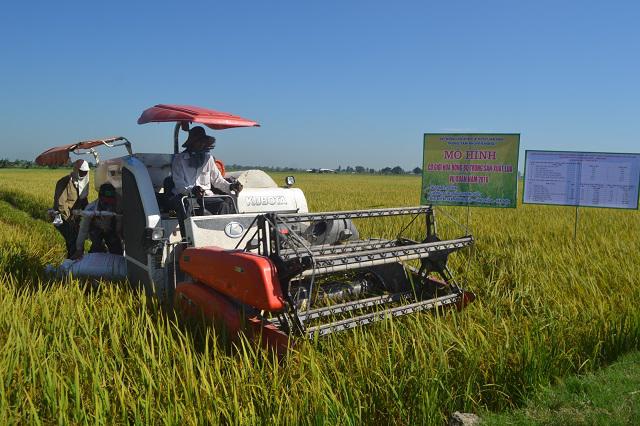Vietnam targets to stay among the world’s top 10 farm produce processing hubs
The Government would push for greater mechanization in agricultural production.
Vietnam targets to develop a modern and sustainable farm produce processing system, meeting growing demands from the local and foreign markets, effectively making the country one of the world’s top 10 agricultural processing hubs by 2030.
| Harvesting rice crops at Ung Hoa District, Hanoi. File photo |
The goal was stated in the Government’s decision No.858 signed off by Deputy Prime Minister Le Van Thanh on the country’s strategy for agricultural mechanization and development of agro-forestry-fishery processing until 2030.
Under the plan, Vietnam's mechanization rate in the farm-based plantation would be over 70% by 2030; 60% in animal husbandry; and 95% in aquaculture.
Furthermore, the growth rate of value-added creation in the agricultural processing industry would reach an average of 8% per year by 2025 and 10% by 2030; more than 70% of major agricultural processing centers adopt medium to high-level technologies, and 60% of Vietnam's agricultural export staples are processed products.
The Government eyes the establishment of major agricultural corporations with financial capabilities and corporate governance comparable to the international level; farm production industrial clusters are linked with mass concentrated supply zones and distribution networks.
Promoting agricultural land consolidation
To ensure the realization of the strategy, the Government would continue to refine regulations on land management, including favorable policies for land parceling and cooperation mechanisms among provinces/cities and Government agencies in mass agricultural production.
It is also expected that technological advancements will be adopted in the farm production process, along with incentives to help train a high-quality workforce to aid the mechanization of the farming industry.
The banking sector is responsible for providing preferential loans for agricultural development, especially for projects of forming large-scale farm produce processing, storing, and distributing centers.
The Ministry of Agricultural and Rural Development would restructure concentrated agricultural production zones into three groups of leading commodities, including national-, provincial, and city-level key products, based on the advantages of each region.
The Ministry is tasked with promoting conditions for mechanization application and development of farm produce processing; strengthening cooperation and linkage in agricultural production and distribution, with businesses being key in the value chains.












